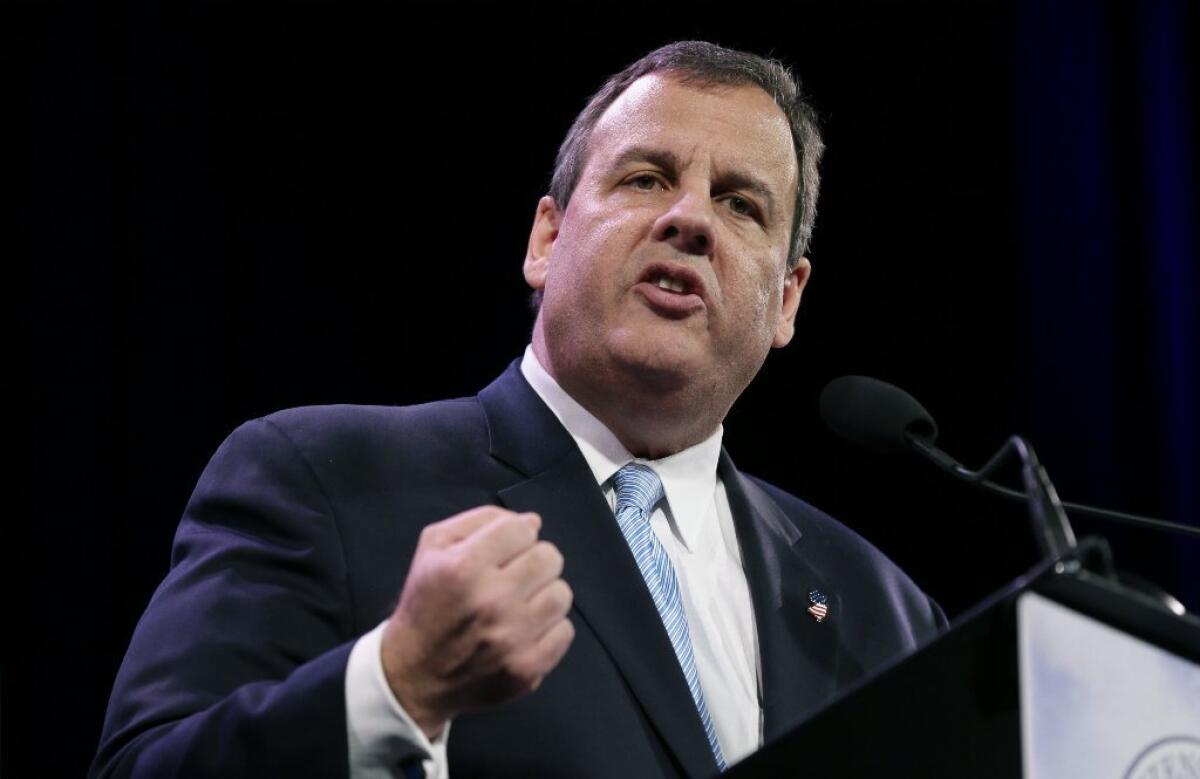Opinion: Vaccine skeptics and Chris Christie say it’s about choice. They’re wrong

- Share via
“Choice” is a great word -- it has a universal, empowering appeal, and it’s useful for winning a debate. Women’s rights activists were smart decades ago to call their side of the abortion debate “pro-choice,” asking us to ignore our feelings on the procedure itself and trust women enough to make their own medical decisions.
So it’s no surprise that vaccine skeptics have now changed the subject from their rightly ridiculed nonscientific claims on autism to the freedom to parent as they wish -- in other words, to make their own choices. And it appears they’ve convinced New Jersey Gov. Chris Christie (or maybe not), who says that even though vaccinating children is crucial and that his own kids got their shots, choice is great too, and parents deserve to have some when it comes to stopping the spread of communicable illness.
Yes, we can note the irony of this being the same governor who recently locked a nurse in a tent to protect New Jersey from an Ebola virus this woman wasn’t carrying, but that’s beside the point. What’s important is that Christie’s statement (you might even call it gaffe) represents the latest strategy for the vaccine skeptics: They’re trying to win apologists for their cause, not an argument on the efficacy of vaccines. Whether you agree with them doesn’t matter -- you could even ridicule their efforts to pass off fraud as science in linking vaccination to autism.
But freedom is a core American value, and everyone deserves to make his or her own choices, especially when it comes to parenting. This is Christie’s logic.
Christie isn’t the only one making this argument. As I’ve noted before, this appeal to choice has replaced autism as our letter writers’ preferred anti-vaccine argument. In response an editorial last week calling for an end to California’s personal-belief exemption for parents who would rather not vaccinate their children, a small handful of readers hyperbolically accused The Times’ editorial board of favoring totalitarianism (one said, “Sorry, but we don’t live in Nazi Germany”). Previously, a reader from Nevada whose letter was published -- much to the dismay of at least a dozen others who sent us their own responses to their letter -- wrote that “freedom means choice. Plain and simple. Without choice, we are not a democracy.”
He continued: “It is my choice whether or not I want to be vaccinated. It is your choice whether or not to wash your hands or take basic public health precautions. It is an individual’s choice whether he or she wants to gamble with their child’s life. It is not your place to say what they have to do.”
Here’s the problem: This isn’t about choice, and vaccine skeptics’ use of freedom instead of autism as their new cri de coeur exposes the joyful self-centeredness of their obstinacy. Any pediatrician (well, perhaps not all pediatricians) will tell you a parent’s decision to vaccinate is as much about other children as their own. Parents who vaccinate their children not only protect their own kids as well as pick up some of the slack for the mothers and fathers who refused vaccination, they also help to protect those who cannot get immunized.
It’s sad for anyone to come down with a preventable disease, but lost in our focus lately on the children of vaccine-skeptical parents who have come down with measles are those who rely on the rest of us who can choose to immunize to make the right choice. These people -- organ transplant recipients, cancer survivors and infants, among others -- might not have the choice that Christie and others champion.
Follow Paul Thornton on Twitter @PaulMThornton
MORE FROM OPINION:
A problem with how we treat cancer -- and how to fix it
How to overcome distraction, seize the ‘meta-moment’ and do the right thing
Sen. Feinstein’s anti-marijuana stance shows she’s too old school for California
More to Read
A cure for the common opinion
Get thought-provoking perspectives with our weekly newsletter.
You may occasionally receive promotional content from the Los Angeles Times.











